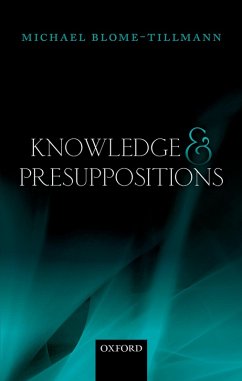Knowledge and Presuppositions develops a novel account of epistemic contextualism based on the idea that pragmatic presuppositions play a central role in the semantics of knowledge attributions. According to Blome-Tillmann, knowledge attributions are sensitive to what is pragmatically presupposed at the context of ascription. The resulting theory-Presuppositional Epistemic Contextualism (PEC)-is simple and straightforward, yet powerful enough to have far-reaching and important consequences for a variety of hotly debated issues in epistemology and philosophy of language. In this book, Blome-Tillmann first develops Presuppositional Epistemic Contextualism and then explores its ability to resolve various sceptical paradoxes and puzzles. Blome-Tillmann also defends PEC against familiar and widely discussed philosophical and linguistic objections to contextualism. In the final chapters of the book PEC is employed to illuminate a variety of concerns central to contemporary discussions of epistemological issues, such as Gettier cases, Moorean reasoning, the nature of evidence, and other current problems and puzzles.
Dieser Download kann aus rechtlichen Gründen nur mit Rechnungsadresse in A, B, BG, CY, CZ, D, DK, EW, E, FIN, F, GR, HR, H, IRL, I, LT, L, LR, M, NL, PL, P, R, S, SLO, SK ausgeliefert werden.









